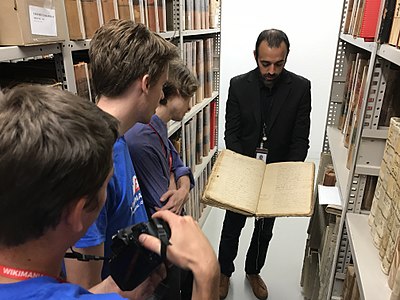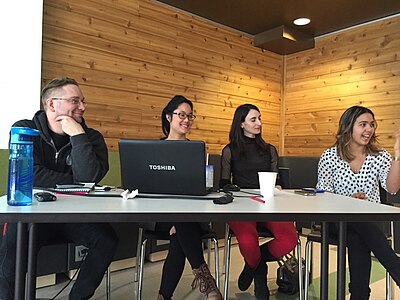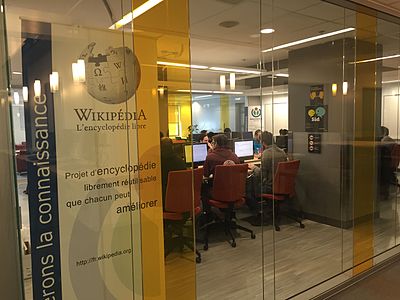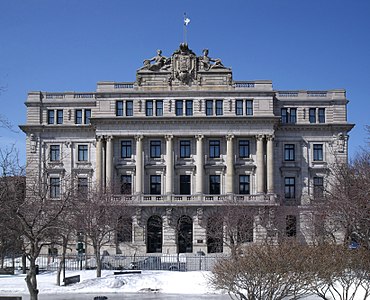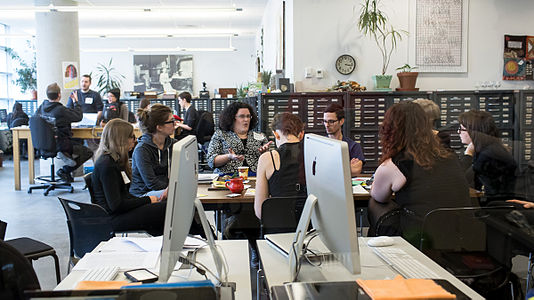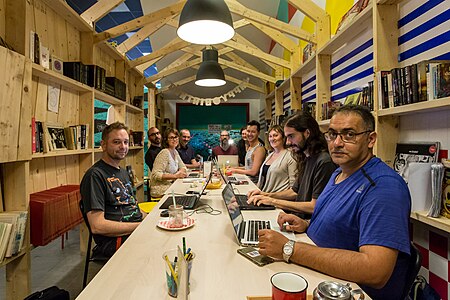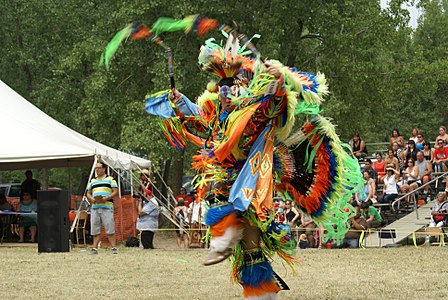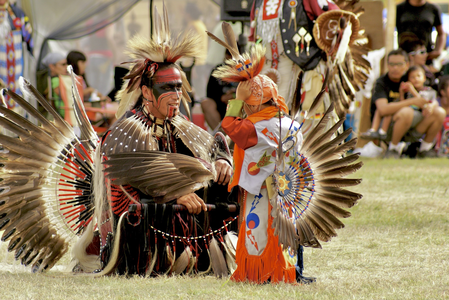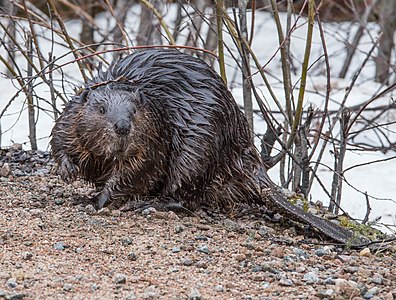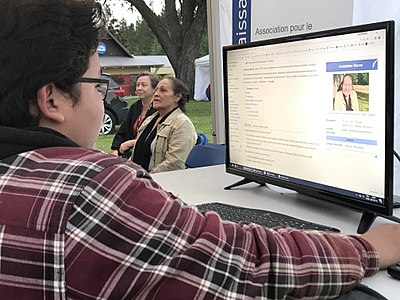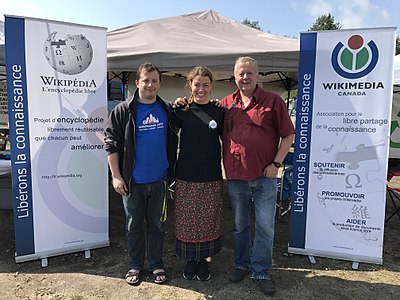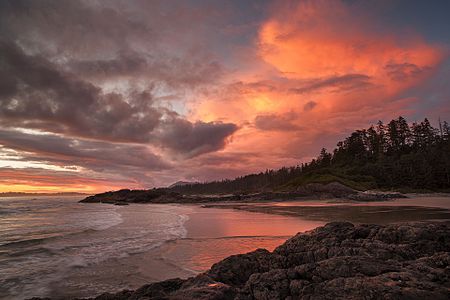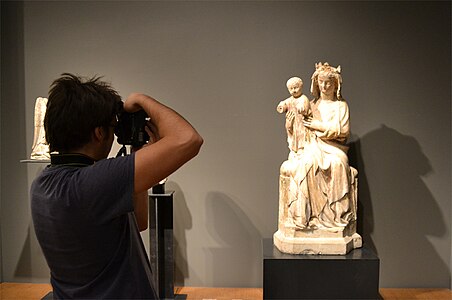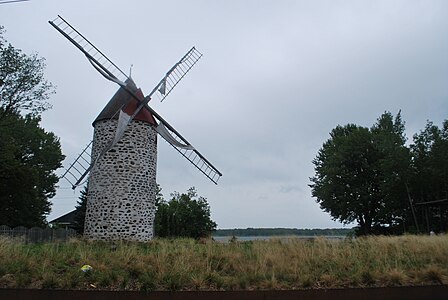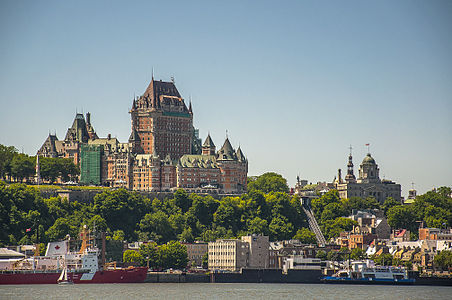Grants:Simple/Applications/Wikimedia Canada/2018/H1
- Application or grant stage: grant in progress
- Applicant or grantee: Wikimedia Canada
- Amount requested: $37,475 ($34,068 and $3,407 contingency fund) CAD (30,000 USD)
- Amount granted: 24,200 CAD (22,000 CAD + 10% contingency fund) (19,000 USD (17,000 USD + 10% contingency fund))
- Funding period: 1 January 2018 to 30 July 2018
- Application created: 1 November 2017
- Recommended application date: 1 November 2017
- Midpoint report due: 15 April 2018
- Final report due: 30 August 2017
Application[edit]
Background[edit]
Link to these documents, for the upcoming funding period, only if you have them.
- Link to your organization's staffing plan, for the upcoming funding period. No staff is requested for 2018 H1. The following link is for a provisional staff position in the future [1].
- Link to your annual plan, for the upcoming funding period. wmca:Annual Strategic Plan 2018
- Link to your strategic plan, which includes the upcoming funding period. [2]
Please add your grants metrics to this sheet. Note that requirements for shared metrics have changed for grants starting 1 January 2017 or later. Please visit this worksheet to view global metrics targets and progress.
Programs[edit]
Please describe any changes to your programs for the upcoming funding period, including the addition of new programs or any programs you are no longer doing. Include your rationale for any major changes to your programs here.
- We have conducted a thorough review of our programs based on our experience during our first APG in 2017 H2. The three programs did not change heavily but have been slightly re-scoped to better fit our strategy, have greater impact and be more flexible.
Please use the templates provided to add information about each program you are planning for the upcoming funding period.

Founded in 2011, Wikimedia Canada is an independent non-profit organization based in Montreal, Quebec and an official chapter of the Wikimedia Foundation and part of the global Wikimedia Movement. We support and promote the distribution of free educational material within Canada, mainly through the Wikimedia projects. Wikimedia Canada engages in a range of activities in support of the vision of the Wikimedia movement such as outreach activities, community-building events, content-creation projects, partnerships with cultural and knowledge institutions, collaborations with Aboriginal communities, training sessions, etc. In 2016-2017, Wikimedia Canada began a process to bring the chapter to a more mature level by developing and putting into place necessary policies and generally improving its corporate standards, including the election of a new board of directors with fresher energy and motivations in August 2017 and the donation of an office space by Bibliothèque et Archives nationales du Québec (BAnQ) in Montreal, Quebec since December 2016.
Wikimedia Canada shares the vision statement of the Wikimedia Foundation: “Imagine a world in which every single human being can freely share in the sum of all knowledge. That's our commitment.”[1]

- Board of directors
- Benoit Rochon, President, Communications Coordinator, Volunteer Wikimedian in Residence at Bibliothèque et Archives nationales du Québec (BAnQ)
- Jean-Philippe Béland, B.Eng, RMC, Vice President, Programs Coordinator, Indigenous Program Coordinator, Canada Lingua Libre Coordinator
- Charlotte Badin, Secretary, Events Coordinator
- Guillaume Lafrance, MBA, CPA, CA, EEE, CFF, Treasurer, professional accountant
- Philippe-Olivier Daniel, BBA, LL.B, Board Legal Advisor, professional attorney
- Antoine Beaubien, IT Manager
- Ha-Loan Phan, Pedegogic Program Coordinator, communications advisor at l'Association francophone pour le savoir (Acfas)
- Lëa-Kim Chateauneuf, Photographic Program Coordinator, professional librairian
- Marie D. Martel, GLAM Coordinator, professional librairian and university teacher
- Partners and collaborators
- Nathalie Casemajor, communications teacher and researcher at Institut national de la recherche scientifique (INRS), collaborator for indigenous projects and organizer of the Franco-Ontarians Project
- Karine Gentelet, indigenous studies teacher and researcher at Université du Québec en Outaouais (UQO), advisor for indigenous projects
- Frédéric Giuliano, archivist-coordinator, BAnQ Vieux-Montréal
- Florian Daveau, archivist, in charge of iconographic, cartographic, architectural and audiovisual archives, BAnQ Vieux-Montréal
- Anne-Marie Boisvert, librarian at the National Collection at the Grande Bibliothèque

The goal of Wikimedia Canada is to augment and improve the content about Canada on Wikimedia projects and to increase the contribution of Canadians in Wikimedia projects, especially in terms of diversity.
To achieve this goal, Wikimedia Canada has identified four priorities for its five years strategic plan 2017-2021:
- Develop and disseminate free knowledge.
- Promote the use of free knowledge resources.
- Encourage the development of open knowledge communities across Canada.
- Achieve and sustain a high level of corporate maturity.
The Annual Plan for 2018 includes activities in all four priorities, but there is a higher focus for the first and third priority. This Annual Plan is aligned with the Wikimedia Strategic Plan (2011-2015)[2] and the on-wiki 2017 Strategy of the Wikimedia movement.[3]
| Program 1: Content, outreach, education and communities | Program 2: Indigenous peoples on Wikimedia projects | Program 3: Photographic content |
Content, outreach and communities
| Develop free knowledge about Canadian cultures, languages, history, geography, sports and other fields of knowledge, and increase the diversity of contributors from Canada. |
-
Picture uploaded by Bibliothèque et Archives nationales du Québec (BAnQ) to Wikimedia Commons during the Conrad Poirier Project that is used on 62 different Wikipedias
-
First scan-a-thon event organized by Wikimedia Canada in partnership with Bibliothèque et Archives nationales du Québec (BAnQ) to scan archive negatives from different locations in Quebec
-
An archivist of Bibliothèque et Archives nationales du Québec (BAnQ) showing one of the oldest manuscripts of the judicial archives preserved at BAnQ during the 2017 Wikimania Pre-Conference
-
A group photo after a presentation to Library and Archives Canada (LAC) of the GLAM projects by Bibliothèque et Archives nationales du Québec (BAnQ) and Wikimedia Canada, including the Librarian and Archivist of Canada, Guy Berthiaume
-
A panel composed of representatives from Wikimedia Canada, the Acfas and the Université du Québec en Outaouais (UQO) presenting the Wikimedia projects during the Research Week at the UQO
-
A WikiPhys workshop, physics contribution workshop to Wikipedia, held at the Université de Montréal
-
The Gilles-Hocquart Building in Montreal, Quebec where Bibliothèque et Archives nationales du Québec (BAnQ) has donated an office space to Wikimedia Canada
-
An Art+Feminism event in Montreal, Quebec aiming at finding solutions to close the gender gap on Wikimedia projects
-
Logo of the International Francophone Contribution Month organized every year by WikiFranca and leaded by Wikimedia Canada
-
An event organized by the Café des savoirs libres in Montreal, Quebec during Fierté Montréal 2017 to improve Wikipedia articles about local LGBT personalities
Context
This program is the continuity of the successful 2017 program "Organize and facilitate workshops" with an increased focus on expanding and strengthening institutional partnerships with Canadian Galleries, Libraries, Archives, Museums and Universities (GLAMUs) as well as developing the contributor communities in Canada. The goal of this program is to develop free knowledge about Canadian cultures, languages, history, geography, sports and other fields of knowledge, mainly on Wikimedia projects, and to increase the diversity of contributors from Canada. To achieve this goal, Wikimedia Canada has identified two axes: "institutional partnerships, education and outreach" and "community building".
Institutional partnerships, education and outreach
Through this program, Wikimedia Canada will strengthen its existing institutional partnerships and seek to establish new ones, mainly with GLAMUs, and will conduct outreach to the public and those institutions to increase the awareness about free knowledge and the Wikimedia projects in Canada. This will mainly be achieved by supporting its members and other volunteers to host contribution workshops, meetings and projects in partnerships with those GLAMUs in order to develop a closer relationship.
Specifically, Wikimedia Canada will continue to partnership with its main partner, Bibliothèque et Archives nationales du Québec (BAnQ). It will also continue to partner with other institutions, including Library and Archives Canada (LAC). Wikimedia Canada will seek to enable partnerships with more local institutions, building on the model of existing partnerships with OpenStreetMaps Montréal and Ottawa, the Association francophone pour le savoir (Acfas), the Lionel-Groulx Foundation and the Cinémathèque québécoise for example. The potential and the impact of such partnerships have been clearly identified with the activities of the past year where they resulted in an increase in content and in contributors to the Wikimedia projects, especially in terms of quality, archival content and diversity of contributors.
Those collaborations have a high potential for innovative initiatives such as the scan-a-thon that was organized with BAnQ to scan negatives that were being lost by oxidation and upload the pictures on Wikimedia Commons, not only did we save this important heritage that would be otherwise lost, but the pictures uploaded were useful resources for Wikipedia and the project was a great way to engage new contributors.
The chapter will also increase its collaboration with the other organizations of the Wikimedia movement in North America and across the Francophonie through WikiFranca in order to share resources and best practices to be more efficient and have a greater impact.
Community building
Wikimedia Canada will support the development and the growth of diverse communities contributing to open knowledge in Canada, by promoting the creation of WikiClubs and supporting Canadians to develop free content, mainly on Wikimedia projects. The development of strong and diverse communities of volunteers across the country will allow the chapter to have a greater impact with its activities. A secondary goal for this program is to increase the awareness and the understanding of the Canadian public about open knowledge, free licenses and Wikimedia projects.
Right now, the volunteers of Wikimedia Canada are mainly centered in Montreal, Quebec. Through this program, the chapter aims at expanding and developing free knowledge communities across the country. It will achieve that by putting in place a framework for the creation of local groups, called "WikiClubs", around specific cities, regions or universities. A group like that already exist in an informal way in Montreal that will be used as a model for the creation of similar groups in other cities, with a few already in the process of being created.
These are groups of multi-project contributors working together for creating new activities in their region, including awareness building, outreach events, training sessions and contribution workshops. A high level of flexibility is offered to these local groups in order to allow them to adapt to their local realities and to the interests of their volunteers and their local partners, which in turn will ensure a diversity of the themes covered across the country and augment the potential of attraction of new contributors.
The chapter will work to establish a network for those local groups to share their experiences and organize regional peer-to-peer support by supporting the establishment of activities and the recruitment of new contributors in different regions of the country. For instance, the chapter will continue to organize the yearly National Contribution Month in Canada which is a great opportunity for volunteers across the country to organize workshops that will allow them to meet with other contributors in their local region and recruit new volunteers. This initiative has demonstrated its success in the past two editions.
A big obstacle to contribution that has been identified is the price of the equipment needed to produce multimedia content. Considering the size of Canada, it is simply impossible for the chapter to maintain equipment and make it available to all volunteers across the country since the price of shipping would be exorbitant. To solve this issue, the WikiClubs will be used as hubs to make equipment available to the volunteers in their region, according to their specific needs. The chapter will only focus those investments to communities of volunteers who are really established in order to ensure that there is a real impact derived from those investments. This will empower the local groups to become independent in their activities, encouraging the growth of those WikiClubs and increasing the numbers of volunteers and contributors in Canada.
The chapter will facilitate and enable the emergence of new local groups by linking volunteers with local cultural and knowledge actors and facilitating the volunteer environment for example by supporting meetings and exchanges between contributors and by creating a map of the WikiClubs and interested volunteers. For instance, Wikimedia Canada will use its strong partnership with BAnQ to develop new WikiClubs around their centres in different locations in Quebec. Wikimedia Canada will also support individual contributors across the country to have access to the resources they need to develop meaningful content on Wikimedia projects, such as the access to references.
Objectives
- Augment, improve and diversify free knowledge about Canada, especially on Wikimedia projects.
- Diversify the contributors from Canada on Wikimedia projects and expand the contribution activities across Canada.
- Increase the awareness of the Canadian public and institutions about Wikimedia projects, free licenses and open knowledge.
Activities
- Activity 1.1: Organize and facilitate contribution workshops, training sessions and specific projects
- Activity 1.2: Outreach to GLAMUs and other similar institutions
- Activity 1.3: Outreach and education to the Canadian public about Wikimedia projects and open knowledge
- Activity 1.4: Support WikiClubs and volunteers in Canada to organize their activities, to improve content on Wikimedia projects and to host meetups
During the 6 months, those activities include:
- Art+Feminism (edit-a-thons in March to improve content on feminism and the arts on Wikipedia and encourage female editorship)
- Franco-Ontarians Project (project to augment and improve content about Franco-Ontarians on Wikimedia projects organized in partnership with the Institut national de la recherche scientifique (INRS))
- International Francophone Contribution Month (edit-a-thons in March to improve Wikimedia projects in French organized by WikiFranca and leaded by Wikimedia Canada)
- Mardi/Jeudi c'est Wiki (monthly edit-a-thons hosted in partnership with BAnQ respectively in Montreal and Quebec City)
Metrics and targets
- Metrics
- The number of contributors from Canada
- The number of content pages created during workshops
- The number of content pages about women on Wikimedia projects
- The number of workshops aimed specifically at increasing the diversity of contributors
- The number of different provinces and territories where contribution workshops are hosted
- The number of different GLAMUs in Canada involved with Wikimedia projects
- The number of WikiClubs
- Targets
- 100 participants to workshops and training sessions
- 140 content pages created or improved during workshops across all the Wikimedia projects
- 35 Wikipedia articles about women created and improved during workshops
- 10 workshops specifically aimed at increasing the diversity of contributors and content on Wikimedia projects (such as women and LGBTQ+)
- 50 workshops and training sessions organized in at least 6 different provinces and territories
- 10 different GLAMUs institutions have hosted a workshop in partnership with Wikimedia Canada
- 3 WikiClubs created in Canada
| Strengths | Weaknesses | |
|
| |
|
| |
| Opportunities | Threats | |
Indigenous peoples on Wikimedia projects
| Develop Wikimedia projects in the indigenous languages of Canada and increase quality free knowledge about Canadian First Nations, Inuit and Métis. |
-
Fancy dancer during a pow-wow at the Manawan Atikamekw Community, picture uploaded to Wikimedia Commons during the Nitaskinan in pictures contest
-
An adult and a child in traditional regalia during a pow-wow at the Manawan Atikamekw Community, picture uploaded to Wikimedia Commons during the Nitaskinan in pictures contest
-
Picture of a beaver taken by a high school student of the Manawan Atikamekw Community and uploaded to Wikimedia Commons during the Nitaskinan in pictures contest
-
A volunteer of Wikimedia Canada recording words in Atikamekw language with an elder of the community during Wikimania 2017
-
A new Innu contributor improving the Wikipedia article about Joséphine Bacon, an Innu poet, during an outreach event organized by Wikimedia Canada's volunteers
-
Group photo in front of the Wikimedia Canada's kiosk during the 2017 pow-wow of the Manawan Atikamekw Community
-
Group photo of volunteers of Wikimedia Canada and employees of the Institut Tshakapesh, an organization representing eight Innu communities in Quebec with the role of preserving the Innu language, culture and education, after an initial outreach meeting
Context
This program is the continuity of the 2017 program "Develop the Wikipetia Atikamekw Nehiromowin" that was renamed to "Develop the Wikimedia Projects in Indigenous Languages" at the mid-point report in order to have a scope that is not limited to only the Atikamekw First Nation, but to all indigenous communities in Canada. For instance, outreach was started in 2017 with the Innu First Nation. The goal of this program is to develop Wikimedia projects in the indigenous languages of Canada as well as increasing and improving the content about Canadian First Nations, Inuit and Métis on Wikimedia projects. Currently, there is a real knowledge gap on Wikimedia projects about the indigenous peoples of Canada, especially about contemporary communities. Most of the content is outdated or only historical, while those communities are still alive and dynamic today. Wikimedia Canada aims at closing this gap by empowering the indigenous communities themselves in producing the free content about them. To achieve this goal, the chapter has identified two main axes: "Wikimedia projects in indigenous languages" and "free knowledge about indigenous peoples".
Wikimedia projects in indigenous languages
Right now, only three Wikipedias in indigenous languages of Canada exist outside the Wikimedia Incubator, and only one of them is active, the Wikipetcia Atikamekw Nehiromowin. Furthermore, the most-used messages of the core Mediawiki interface are only translated in one Canadian indigenous language, the Atikamekw language. Wikimedia Canada will build upon the very successful project with the Atikamekw First Nation to emulate it with other indigenous linguistic communities across the country. In partnership with the Institut national de la recherche scientifique (INRS) and the Université du Québec en Outaouais (UQO), the chapter will complete a toolkit recording all the lessons learned and the best practices identified from the Atikamekw project that will be used to do similar projects with other communities in Canada and will also be shared with the Wikimedia movement to be used in other countries. The intent of those projects is to outreach to indigenous communities and teach them how to create a Wikipedia in their languages in the Wikimedia Incubator, how to develop it so it can be created outside the Incubator and how to translate the interface of MediaWiki, with the final intent to develop the skills of those communities so they can become autonomous in developing the Wikipedias in their languages.
Wikimedia Canada will continue to partner with other like-minded organizations such as Global Voices in Latin America to develop a network to share best practices and lessons learned to develop Wikimedia projects in indigenous languages and smaller languages that are under-represented on Wikimedia projects and face different challenges than the more established communities. The success of the project to create the Wikipetcia Atikamekw Nehiromowin has become a model at the international level, as was seen during presentations at Wikimania, where there is a real interest from all around the world to develop similar projects. The chapter will continue and increase its collaborations to share its expertise in this area with other organizations. The chapter also plans to partner with academics from Canadian universities and the First Nations involved in the project themselves to present this project to a wide audience involved with indigenous languages with the goal of showing the potential of the Wikimedia projects in revitalizing those languages that are at risk of being extinct in a very near future and involving the young people of those communities who are often in difficult situations for many different reasons.
The results observed with the Atikamekw Project far exceeded our expectations as we have seen the community really taking ownership of the project, of their Wikipedia, and the students involved all shared their great pride in seeing their language online and that they can contribute to it. It has now become a truly intergenerational project where elders are helping the young people with the language to write on Wikipedia. The momentum of this project is now guaranteed by members of the community itself. The model of WikiClubs will also be applied to indigenous communities for the development of local indigenous communities of contributors, which is already started in Manawan, Quebec for example. To ensure the success of similar projects with other communities, Wikimedia Canada will first seek partnerships with cultural and educational organizations from those communities that will take ownership of the projects from the get go as well as partnering with other Canadian organizations involved with indigenous communities such as the First Peoples' Cultural Council in British Columbia.
Free knowledge about indigenous peoples
In parallel to the projects to develop Wikimedia projects in Canadian indigenous languages, the outreach events, training sessions and contribution workshops hosted with indigenous communities will also aim at empowering the indigenous communities in developing content on Wikimedia projects about themselves in English and/or French that can then be translated in other languages from contributors from all around the world. For instance, a fact that was highlighted during the Atikamekw project from the Atikamekw cultural actors was that the articles on the French and English Wikipedias about the rivers, the mountains and other geographical features in their region only use the names given by the French colonizers while those places already had names in the Native language for centuries before that. Now, the names of those places are added to Wikipedia and Wikidata in the Atikamekw language.
Wikimedia Canada will also organize and promote workshops and activities to teach indigenous communities how to contribute photographic content to Wikimedia Commons that can be used on the Wikipedias in their languages and to illustrate articles about them on the Wikipedias in all languages. In particular, the chapter will continue to support the "Nitaskinan in pictures" photographic contest organized on the Atikamekw ancestral territory to document traditional activities of the Atikamekw people.
Lingua Libre
Besides developing written and photographic content about the indigenous peoples of Canada on Wikipedia, Wikidata and Wikimedia Commons, Wikimedia Canada will continue to use the Lingua Libre initiative to record the Canadian indigenous languages and upload the files to Wikimedia Commons. Those files will then be used to develop content on Wiktionaries. It can also be used on all other Wikimedia projects as was seen by the creation of an “Introduction to the Atikamekw language” on the French Wikiversity using those files to teach pronunciation. This is a crucial project since most Canadian indigenous languages are at risk of disappearing in a very near future and recording this important knowledge for use by future generations is essential to preserve that heritage. For instance, when volunteers from Wikimedia Canada conducted outreach with the Institut Tshakapesh, an organization representing eight Innu First Nations in Northeastern Quebec with the role of preserving the Innu language, culture and education, the Lingua Libre initiative was the aspect of Wikimedia projects that they were the most interested in, so they can develop an online dictionary of the Innu language with recordings for pronunciation of the words.
Objectives
- Augment and improve free knowledge written in Canadian Aboriginal languages, especially on Wikimedia projects.
- Augment, improve and modernize free knowledge about Canadian indigenous peoples, especially on Wikimedia projects.
- Increase the awareness about open knowledge, free licenses and Wikimedia projects of the indigenous communities.
Activities
- Activity 2.1: Outreach to indigenous communities about Wikimedia projects and free knowledge
- Activity 2.2: Develop Wikimedia projects in Aboriginal languages
- Activity 2.3: Improve free knowledge about Canadian indigenous peoples
- Activity 2.4: Collaborate and share experiences about indigenous projects with other organizations working on developing open knowledge in indigenous languages, and promote the Wikimedia projects as a tool for language revitalization
During the 6 months, those activities include:
- Conference in Ottawa (participation in a scientific seminar to present the Atikamekw Project)
- Lingua Libre (project to record words in aboriginal languages and upload files on Wikimedia Commons to use them on Wiktionaries)
- Nitaskinan in pictures (photographic event on the Atikamekw traditional territory for Wikimedia Commons)
- Presentation at UN (presentation of the Atikamekw Project at the UN Permanent Forum on Indigenous Issues in New York City)
- Publication of a toolkit on creating a Wikipedia in indigenous languages in English and French (in partnership with the Institut national de la recherche scientifique (INRS) and the Université du Québec en Outaouais (UQO))
- Wiki Ciwakamihikan (meetings every two weeks on the Manawan Atikamekw Community to improve the Wikipetcia Atikamekw Nehiromowin)
Metrics and targets
- Metrics
- The number of content pages written in Canadian Aboriginal languages on Wikimedia projects
- The number of content pages about Canadian indigenous peoples on Wikimedia projects
- The number of pictures about indigenous peoples of Canada on Wikimedia Commons
- The number of words recorded in indigenous languages of Canada
- The number of active Wikipedia projects, inside or outside the Wikimedia Incubator, in Canadian Aboriginal languages
- The percentage of translation of MediaWiki in Canadian Aboriginal languages
- The number of workshops, training sessions and outreach events organized with indigenous communities
- Targets
- 60 Wikipedia articles created in indigenous languages of Canada
- 110 content pages about indigenous peoples of Canada created or improved across all Wikimedia projects
- 80 pictures about indigenous peoples of Canada uploaded to Wikimedia Commons
- 100 words in indigenous peoples of Canada recorded and uploaded to Wikimedia Commons
- 3 different Wikipedias in indigenous languages of Canada had at least 3 contributors
- 25 messages of MediaWiki translated in indigenous languages of Canada
- 12 workshops, training sessions and outreach events organized with indigenous communities
| Strengths | Weaknesses | |
|
| |
|
| |
| Opportunities | Threats | |
Photographic content
| Increase free photographic content about Canada and educate Canadian photographers communities about free licenses. |
-
Picture of the Pacific Rim National Park in British Columbia, winner of the first edition of the Wiki Loves Earth contest in Canada in 2017
-
A volunteer photographer of the Projet Québec taking pictures at the Montreal Museum of Fine Arts for Wikimedia Commons
-
A volunteer of the Quebec City Wikipedians Photo Club during a photoshoot of a hockey game of the Bulldogs of Montreal
-
A photograph of the national sport of Canada, ice hockey, taken by a volunteer of the Quebec City Wikipedians Photo Club, thanks to receiving a special journalistic access from the Canadiens de Montréal
-
A windmill in the neighbourhood of Pointe-aux-Trembles in Montreal, Quebec, picture taken during Wikipedia Takes Montreal
-
View of the Château Frontenac from Levis, Quebec, picture taken during Wikipedia Takes Quebec City
Context
This program is the direct continuity of the 2017 program "Conduct photography events". The goal of this program is to increase the free photographic content about Canada, both in terms of quantity and quality, especially where there are gaps on Wikimedia Commons and Wikipedia. It also aims at outreaching to the Canadian photographers communities to educate them about free licenses and the Wikimedia projects. The intent is to create volunteer photographers communities across the country that are sensible to the cause of free knowledge and upload some of their work on Wikimedia Commons. To have more impact, this will be developed hand in hand with the WikiClubs. To achieve this goal, Wikimedia Canada will support its members and other volunteers in two ways: to host local photographic events and to attend events in Canada. The chapter will also organize photographic contests at the national level. A focus is placed on content that is a gap on Wikimedia Commons.
Hosting photographic events
Wikimedia Canada will support its members and other volunteers in hosting local photographic events like Wiki Takes Your City, building on the very successful Wiki Takes Montréal conducted in 2011. The intent of those events are two folds. The first is the obvious direct impact to increase the quantity and the quality of the photographic content about Canada on Wikimedia Commons. The second is the indirect impact of community building through those photographic events. By bringing people together for local photographic events, the volunteers and the contributors will develop relationships that will be fostered for the creation of WikiClubs and local photographers communities that upload some of their work on Wikimedia Commons.
Support volunteers to attend events in Canada
Wikimedia Canada will support its members and other volunteers to attend events in Canada in order to document them for Wikimedia Commons and Wikipedia as well as documenting specific subject matters in Canada where there is currently a gap on Wikimedia Commons. To achieve more impact, this will be implemented in parallel with contribution workshops with GLAMUs and WikiClubs that will work in developing content on Wikipedia about those events or subject matters that now have photographic material.
National photographic contests
Wikimedia Canada will continue to organize national photographic contests, including Wiki Loves Monuments and Wiki Loves Earth that were held in 2017. The chapter will also introduce a new national contest about the towns and villages of Canada since most of the Wikipedia articles about those are not illustrated at all. The intent of those national contests is to augment the quantity and the quality of photographic content on Wikimedia Commons about important locations and subjects in Canada as well as promoting the Wikimedia projects and free knowledge to the Canadian public.
Objectives
- Increase the quantity, the quality and the diversity of free photographic content about Canada.
- Increase the number and the diversity of photographers in Canada sharing some of their work under a free license or in the public domain.
Activities
- Activity 3.1: Organize and facilitate national and local photographic events
- Activity 3.2: Support volunteers to document specific Canadian events and thematics
During the 6 months, those activities include:
- Wiki Loves Earth (national photographic contest about natural protected areas)
- Wiki Takes Your City (local photographic event around a specific city)
- WikiCheese (activities to photograph local cheese for Wikimedia Commons and document them for Wikipedia)
Metrics and targets
- Metrics
- The number of pictures of Canada on Wikimedia Commons
- The number of Wikipedia articles illustrated with pictures of Canada from Wikimedia Commons
- The number of different Canadian photographers uploading pictures on Wikimedia Commons
- The number of specific Canadian events documented with pictures on Wikimedia Commons
- Targets
- 500 pictures of Canada uploaded to Wikimedia Commons
- 100 articles on Wikipedia has been illustrated with a picture of Canada from Wikimedia Commons
- 110 different Canadian photographers have uploaded at least one picture on Wikimedia Commons
- 5 specific Canadian events have been documented with at least 10 pictures uploaded on Wikimedia Commons
| Strengths | Weaknesses | |
|
| |
|
| |
| Opportunities | Threats | |
Staff and contractors[edit]
Please describe any changes to your staffing plan for the upcoming funding period. These should include increases in staff or contractor hours, new staff positions, or staff positions you are removing. Include your rationale for any staffing changes here.
- No change, no staff.
For each new staff or contractor position, please use the template provided to add information about each new staff or contractor you are planning for the upcoming funding period (or to describe significant increases in hours or changes in job descriptions for existing staff). You are not required to provide this information for existing staff where no changes are required.
Budget and resource plan[edit]
Link to a detailed budget for the upcoming funding period. This budget should include all of your organizations expenses. Please specify which expenses will be covered from your APG.
Midpoint report[edit]
This is a brief report on the grantee's progress during the midpoint reporting period: 1 January - 31 March 2018.
Program story[edit]
Please link to one program story that showcases your organization's achievements during the reporting period.
Progress[edit]
Please add text or a link to a page with details on your program progress. This should including reporting against each of the SMART objectives form your proposal.
Content, outreach and communities
- Number of participants to workshops and training sessions: >120%
- Number of content pages created or improved during the workshops across all the Wikimedia projects: >22%
- Number of Wikipedia articles about women created and improved during workshops: >90%
- Number of workshops specifically aimed at increasing the diversity of contributors and content on Wikimedia projects (such as women and LGBTQ+): >20%
- Number of workshops: >28%
- Number of different provinces where a workshops have been organized: 33%
- Number of different GLAMUs institutions that have hosted a workshop in partnership with Wikimedia Canada: 60%
- Number of WikiClubs in Canada: 100%
Indigenous peoples on Wikimedia projects
- Number of Wikipedia articles created in indigenous languages of Canada: >15%
- Number of content pages about indigenous peoples of Canada created or improved across all Wikimedia projects: >14%
- Number of pictures about indigenous peoples uploaded to Wikimedia Commons: 0%
- Number of different Wikipedias in indigenous languages of Canada with at least 3 contributors: 33%
- Number of messages of MediaWiki translated in indigenous languages of Canada: 0%
- Number of workshops, training sessions and outreach events organized with indigenous communities: 0%
Photographic content
- Number of pictures of Canada uploaded to Wikimedia Commons: 0%
- Number of articles on Wikipedia illustrated with a picture of Canada from Wikimedia Commons: 0%
- Number of different Canadian photographers who uploaded at least one picture on Wikimedia Commons: 0%
- Number of specific Canadian events documented with at least 10 pictures uploaded on Wikimedia Commons: 0%
Spending[edit]
Please report your organization's total spending during the reporting period, or link to a financial document showing your total spending.
Final report[edit]
This is the final report for your grant, describing your outcomes from the period 1 January - 30 June 2018.
Program story[edit]
Please link to one program story that showcases your organization's achievements during the reporting period.
Learning story[edit]
Please link to one learning story that shows how your organization documents lessons learned and adapts its programs accordingly.
Results[edit]
Please add text or a link to a page with details on your program results. You should report on each of the objectives you included in your Simple APG application.
Final grant metrics achievement
See activity report.
Content, outreach and communities
- Number of participants to workshops and training sessions: >562%
- Number of content pages created or improved during the workshops across all the Wikimedia projects: >1774%
- Number of Wikipedia articles about women created and improved during workshops: >90%
- Number of workshops specifically aimed at increasing the diversity of contributors and content on Wikimedia projects (such as women and LGBTQ+): >20%
- Number of workshops: >94%
- Number of different provinces where a workshops have been organized: 33%
- Number of different GLAMUs institutions that have hosted a workshop in partnership with Wikimedia Canada: 60%
- Number of WikiClubs in Canada: 100%
Indigenous peoples on Wikimedia projects
- Number of Wikipedia articles created in indigenous languages of Canada: >42%
- Number of content pages about indigenous peoples of Canada created or improved across all Wikimedia projects: >14%
- Number of pictures about indigenous peoples uploaded to Wikimedia Commons: >129%
- Number of different Wikipedias in indigenous languages of Canada with at least 3 contributors: 33%
- Number of messages of MediaWiki translated in indigenous languages of Canada: 0%
- Number of workshops, training sessions and outreach events organized with indigenous communities: 50%
Photographic content
- Number of pictures of Canada uploaded to Wikimedia Commons: >269%
- Number of articles on Wikipedia illustrated with a picture of Canada from Wikimedia Commons: >93%
- Number of different Canadian photographers who uploaded at least one picture on Wikimedia Commons: >275%
- Number of specific Canadian events documented with at least 10 pictures uploaded on Wikimedia Commons: >40%
Spending[edit]
Please link to a detailed financial report for your spending during the grant period. This should be in the same format as your detailed budget from your Simple APG application.
Please include the total amount of Simple APG funds you spent during the grant period.
- Total spent for 2018 H1: 19,827.50 CAD (15,211.06 USD). Total spent from SAPG 2018 H1: 16,486.52 CAD (12,646.62 USD)



